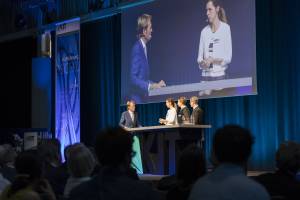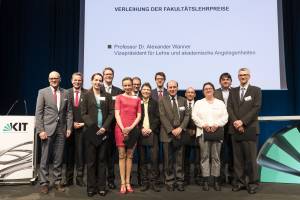How will work conditions, jobs, and added value processes change in the future? What happens to our tasks and our society in the course of digitization? These topics and challenges are dealt with by scientists of Karlsruhe Institute of Technology (KIT). In line with the proclaimed Science Year, “Working Life of the Future” and diverse research activities of KIT were in the focus of the Annual Celebration, from cooperation between humans and machines to Industry 4.0 to the opportunities and risks of new technologies.
“Digitization of the work environment is a topic that arouses emotions: Enthusiasm, but also concerns and fears. KIT conducts research relating to various facets of this topic, from changing workplaces, activities, and workflows to social impacts of this change,” said the President of KIT, Professor Holger Hanselka. “It is our declared mission to contribute our results of research, academic education, and innovation to the progress of society and to answering the pressing questions of the future. Based on the large scope of disciplines covered by KIT, we see particular challenges in the areas of energy, mobility, and information. When speaking about future working life, findings from exactly this spectrum of topics will shape and influence our society
and future work conditions.”
Hanselka pointed out that shaping the future is a task derived from the mission of KIT. “For this, we already are in a good position and we address this challenge by our scientific work.” As an example, he mentioned research relating to human-machine interfaces in smart work environments. Based on physiological data, robots can recognize the emotional state and needs of human beings and can react accordingly. Teams of KIT also work on smart sensors for industry robots, augmented-reality glasses that support repairs by fading in additional information, and on the further qualification and development of new measures for employees and companies in Industry 4.0. An important aspect also is technology assessment that focuses on the interactions between new technologies and society.
“Information and information competence play a central role in all these projects. At KIT, information always is closely interconnected with energy and mobility. In this respect, KIT is an important, very active player – and we will “stay focused” and ensure comprehensive research, in particular in areas of big data, artificial intelligence, machine learning, and IT security,” Holger Hanselka said. He also considered it an important task to further push research into autonomous systems and artificial intelligence. According to the annual report of the Expert Commission for Research and Innovation (EFI) published in February, Germany’s commitment in this field has to be further increased. “We would like politics to launch a national artificial intelligence strategy to enhance the scientific and technological competitiveness of Germany. This national strategy should be embedded in a European strategy to jointly make Europe a scientific and economic counterbalance to the research institutions in the USA and China.”
Research, Teaching, Innovation at KIT – The Highlights of the Past
Year Portrayed Briefly:
https://www.kit.edu/downloads/jahresfeier_2018_intro.mp4 (in
German)
Panel Discussion
Inspired by the slogan of the 2018 Science Year, working life of the future also was the subject of the panel discussion presented by Markus Brock. Professor Michael Beigl, Institute of Telematics, Chair for Pervasive Computing Systems, Professor Barbara Deml, Institute for Human and Industrial Engineering, and Professor Ingrid Ott, Institute for Economic Policy Research, Chair of Economic Policy, discussed changing work processes, digitization, and risks and opportunities of new technologies.

Panel discussion on future working life (from left to right): Presenter Markus Brock, Professor Ingrid Ott, Professor Barbara Deml, Professor Michael Beigl. (Photo: Sandra Göttisheim, KIT)
Department Teaching Awards
Department Teaching Awards are granted by the Presidential Committee to research- and application-oriented teaching modules and courses offered by KIT Departments, which are characterized by innovative teaching and learning approaches, interdisciplinarity, and up-to-dateness of the knowledge conveyed. At KIT’s Annual Celebration, KIT Vice President for Higher Education and Academic Affairs, Professor Alexander Wanner handed over this award to twelve lecturers. The award endowed with a prize money of EUR 10,000 each is granted annually to teachers working at the eleven KIT Departments.

The winners of the Department Teaching Award together with Vice President Professor Alexander Wanner. (Photo Sandra Göttisheim, KIT)
The winners of the Department Teaching Award in short video portraits: https://www.kit.edu/forschen/23667.php (in German)
Elevator Pitch
The idea of an elevator pitch is to convince an investor or the boss of a business idea within the period spent in the elevator together. Four startups that originated from the PionierGarage university group of KIT presented their ideas in 90 seconds each and the audience chose its winner: understand.ai annotates videos and images for autonomous driving with own deep learning algorithms.
Being “The Research University in the Helmholtz Association”, KIT creates and imparts knowledge for the society and the environment. It is the objective to make significant contributions to the global challenges in the fields of energy, mobility, and information. For this, about 10,000 employees cooperate in a broad range of disciplines in natural sciences, engineering sciences, economics, and the humanities and social sciences. KIT prepares its 22,800 students for responsible tasks in society, industry, and science by offering research-based study programs. Innovation efforts at KIT build a bridge between important scientific findings and their application for the benefit of society, economic prosperity, and the preservation of our natural basis of life. KIT is one of the German universities of excellence.
